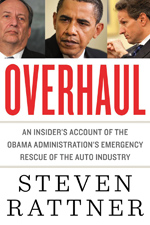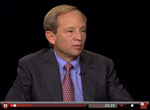Originally appeared in the Daily Beast.
The Democratic attacks on Obama’s Treasury undersecretary nominee are ill-informed and can only lead to pointless fratricide.
My friend and former partner Antonio Weiss has poked his head above the parapet and volunteered for government service, only to be met with a volley of friendly fire from fellow Democrats.
By now, the contours of Weiss’s story should be familiar: After a distinguished 24-year career in investment banking and extensive vetting by the White House, President Obama nominated him to be Treasury undersecretary for domestic finance, with responsibilities ranging from managing the public debt to helping implement the Dodd-Frank legislation.
Almost immediately, he came under attack from a gaggle of more liberal senators, including Elizabeth Warren: Treasury is already stuffed with Wall Street refugees. A Wall Street person should not be allowed to help oversee the Dodd-Frank reforms. Lazard dodges U.S. taxes by incorporating in Bermuda, and Weiss advised on at least one “tax inversion,” the process of transforming a U.S. company into a foreign one, also to reduce tax bills.
Oh, and let’s not forget that Weiss was also criticized for not knowing enough about the debt management process, which means that he is being opposed simultaneously for being too much of a Wall Street guy and not enough of one.
In response, I offer this: I was in a leadership position at Lazard when Antonio was made a partner, and he is as qualified for the position at hand as anyone I have worked with in my 32 years in financial services.
His experience is broad based, and includes substantial knowledge about capital markets and complex financings, exactly the knowledge that his new job demands.
On top of that, he is truly a progressive Democrat. Among other activities on behalf of our shared cause, he was a co-author of a Center for American Progress paper that called for a balanced approach to stabilizing the country’s debt while implementing comprehensive tax reform, including higher taxes on rich Americans (including himself).
As for the more specific complaints, Treasury is hardly filled with financial services experts; in fact, it has been nearly denuded of them by the difficulty of vetting and confirmation.
Yes, Jack Lew, the Secretary, worked at Citigroup — but for a mere two years; the vast bulk of his career has been in the public sector and at New York University. Nathan Sheets, Antonio’s would-be counterpart as undersecretary for international affairs, spent three years at Citi – as an economist. That followed 18 years at the Federal Reserve.
And so on.
Nor does Lazard engage in the kinds of financial engineering that contributed to the near-collapse of the financial system; the firm is as likely to peddle white rhinoceroses as sub-prime mortgages. Indeed, as an almost purely advisory firm, Lazard is (appropriately) barely affected by the Dodd-Frank reforms.
Antonio’s activities at Lazard consisted of investment banking the old-fashioned way, the same kind of work the firm has been doing for more than 150 years. Practiced responsibly – as Antonio indisputably did – investment banking helps companies raise needed capital, shed unwanted units and acquire businesses that enhance their prospects.
It’s true that Lazard and Antonio advised Burger King on its merger with Tim Horton’s, which some have termed a tax inversion. But Warren Buffett, who provided the equity investment that facilitated the deal, said “it doesn’t have anything to do with taxes.”
Moreover, in the merger business, investment bankers are not generally the drivers of tax structuring; that’s the purview of lawyers.
Finally, Antonio had nothing to do with Lazard’s decision a decade ago to redomicile to Bermuda as a legal – albeit distasteful – tax avoidance strategy.
No one doubts that excesses on Wall Street contributed to financial crisis (as, of course, did an immense failure on the part of regulators.) But that should not exclude from government service individuals whose careers have been dedicated to working in finance in a responsible, productive way.
Given Antonio’s impeccable qualifications, it’s hard to see him as anything other than a pawn in the struggle over how the Democratic Party should be positioned in the wake of the 2014 electoral debacle and in advance of the 2016 presidential election.
Democrats need to avoid the basic mistake that both parties have made so many times in the past of letting relatively small differences ignite a civil war that can only result in defeat in the next election.
We are all committed to the same goals for our economic policy: faster growth, fairer distribution of the fruits of that growth, and a more robust government to ensure that both goals are achieved.
To achieve that, we should stand down from this nascent fratricide and accept President Obama’s recommendation of Antonio Weiss to be undersecretary of the Treasury for domestic finance.


